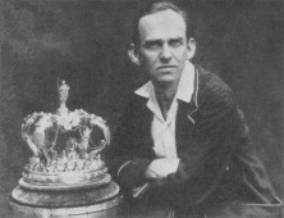Codebreakers, prophets and freedom of speech

Benedict Cumberbatch in The Imitation Game (2014)
It is well known (not least from the Benedict Cumberbatch movie Breaking the Code) that chess masters were largely responsible for unravelling Nazi codes at Bletchley Park during World War II. Figures such as Harry Golombek OBE, C H 0’D (Hugh) Alexander CBE and Sir Stuart Milner Barry, all of whom were personal friends of mine, played a pivotal role in covertly uncovering Nazi plans. Even Alan Turing himself, the presiding genius of the entire establishment, whom I never met, was a chess-player.
After hostilities ceased, the decoders were bound by law, in the instrument of the official secrets act, to silence. Hence much vital information from those wartime days has dissolved in the waters of Lethe, even though later developments in computer technology would have rendered the codebreakers’ clandestine knowledge, thoroughly obsolete.
This brings me to the question of freedom of speech. Our lords and masters maintain that we have always enjoyed freedom of speech in England and the UK, yet this is belied by the crepuscular activities of our thought police, only too ready to pounce on the low hanging fruit of an errant tweet, rather than the infinitely more onerous task of plucking real criminals from the topmost branches of the tree of malfeasance.
It is increasingly my view that we have never really enjoyed freedom of speech, in spite of the protestations of the present Prime Minister. Two noted British chess masters, B. H. Wood and William Winter, were excluded from Bletchley on account of their suspected Communist sympathies. In 1921 Winter had even been incarcerated for six months for sedition — that is, expressing his political opinions.

William Winter
What has led to the apparent increase in prosecution of free speech is the vastly increased amount of unguarded personal expression which now gushes forth on the internet via, for example, X (formerly Twitter). Easy prey for the Myrmidons of the Mind.
In Winter’s case, at least, there were grounds for suspicion that his communist proclivities might tempt him to favour Soviet opponents in on board battles, or indeed Soviet spooks in the information war. At Nottingham 1936, for example, a veritable super-tournament of the world’s chess titans, Winter agreed a last round draw with the Soviet representative, Botvinnik, thus enabling the Russian to tie first with the immortal Capablanca. The problem (as Alekhine’s commentary points out) is that Winter, though generally outclassed in this tournament, had an easy win when he conceded the draw. Whether he missed the win or had political reasons we shall probably never know.
Nottingham (1936)

So, have we ever enjoyed freedom of speech? An example from the mid 17th century, one James Hunt, not known as a chess player, reinforces my suspicion that free speech is only truly possible, provided that one does not cross the red lines established by the powers that be.
The 1640s and 1650s “gave wide publicity to what was almost a new profession – the prophet”, one who emerged from the motley crew of Diggers, Levellers, Ranters and Fifth Monarchy Men, and one who was able to interpret the Bible without formal ordination or a university education. Indeed, such a prophet was James Hunt of Sevenoaks, who was committed to London’s Bridewell prison in 1640 by the Court of High Commission as a fanatic and for his unauthorised preaching in St Paul’s churchyard. By his own account Hunt had been a lay preacher in London since 1636 and he repeatedly emphasised his role as a prophet and messenger from God in his later publications.
In print in 1645, Hunt castigated both Protestants and Catholics for their cold faith in refusing to ”beleeve that I am a true Prophet except I can shew you a miracle”. Like the later Quakers, he also maintained that he was endowed with the inner light of God, who ”hath ordained me to be a preacher”. He also challenged the ordained clergy in their own churches and maintained that all God’s ”saints and servants should have free liberty for to declare their mind in the church in an orderly and decent way’”. For Hunt, the prophet and the preacher fulfilled the same roles, “for prophesying is to unfold the mysteries of God, to the praise and glory of his grace, and to the confounding of false power and false doctrine which proceedeth from the devill, and preaching is for the very same purpose”. Earlier he had described himself as “I, James Hunt, a Minister and Messenger of Jesus Christ” and confidently asserted that “God hath raised me up to be a true and sound preacher of his Word”. To the extent that prophesying contained an element of foretelling the future, this lay for Hunt in interpreting God’s intentions for humanity through the lens of the biblical book of Revelation, which describes the dramatic events heralding the second coming of Christ and the destruction of the Antichrist. Hunt repeatedly utilised the imagery of this last book of the Bible in his preaching and publications.
For over a decade Hunt was a thorn in the side of successive governments both national and local, and during the Civil War he was repeatedly imprisoned. In 1642 he claimed to have been in prison eight times “for speaking and justifying nothing but the very truth, to the praise and glory of God”. By 1643 the tally had risen to ten periods of incarceration. Yet he also found time to publish eleven tracts in which he attacked anyone in authority who tried to prevent him from preaching including the bishops, the clergy as a caste, the clergy at his home parish of Sevenoaks, and the parliamentarian county committee for Kent.
The county of Kent fell under parliamentarian control in the summer 1642 even before the civil war had officially started. There were no major battles there during the First Civil War, although there were minor royalist risings in West Kent in 1643 in 1645. Yet Hunt rarely engaged directly with the political and military developments of the 1640s until the outbreak of the Second Civil War, which in the south of England centred mainly in Kent and Essex. In 1648 Hunt criticised Sir Thomas Fairfax, Commander in Chief of the New Model Army, as a warmonger and Parliament’s excise men for taxing the people in order to pay for the war. In 1653 Hunt was in prison in the Gatehouse at Westminster and the last we hear of him is in 1660 when he stood on a stool amidst a crowd at the Exchange and demanded that “if any man in the Town, or Country, can tell me what good the Parliament hath done these eight yeares, let him come, and speak”. He was, unsurprisingly, once again committed to London’s Bridewell prison. The parallels with modern times are alarming! I am grateful to Professor Emerita Jackie Eales, my sister, for drawing my attention to this singular ancient parallel with our contemporary political prisoners and attempts by authority to gag inconvenient viewpoints which run counter to the official line.

Mikhail Botvinnik
Mikhail Botvinnik vs. William Winter
Nottingham, 1936, rd. 15
Notes by Alexander Alekhine (except where italicised)
- Nf3 Nf6 2. c4 c6 3. Nc3 d5 4. e3 g6
Entering the Schlechter variation of the Slav defence, which according to modern theory leaves White with but an insignificant advantage.
- d4 Bg7 6. Qb3 O-O 7. Bd2 b6
The slight weakness at c6 occasioned by this move is not easy to exploit.
- cxd5 cxd5 9. Ne5 Bb7 10. Bb5 a6 11. Be2 Nbd7!
Somewhat better than …Nc6 as Black has now the prospect of playing …b5 followed by …Nb6.
- Nxd7?
If Botvinnik had not intended to take the d-pawn on his next move, he certainly would have avoided this exchange and played 12. f4 which was the logical sequence to 9. Ne5.

12… Nxd7 13. f4
He realised now that 13. Nxd5 e5! would lead to complications in Black’s favour. But also after the text-move his advantage is definitely gone.
13… e6 14. O-O f5
Black had no reason to hurry with this move, which should be made only in case of necessity. The natural course was …Rb8 followed by …b5.
- Bf3 Rb8 16. Rac1 b5 17. Ne2
- a4 would be advantageously answered by …bxa4 as well as …Bc6. The text-move prepares an irrelevant exchange, which, as will soon be seen, only facilitates Black’s work of simplification.
17… Re8 18. Qa3 Bf8 19. Bb4 Bxb4 20. Qxb4 Qb6 21. Rc2 Kf7
Protecting e7 and thus making ready …Rec8.
- Nc1?

By doubling his rooks on the open file White could obtain an easy draw. From now on Black gets the initiative.
22… Rbc8 23. Rff2 Rc4!
With this important gain of tempo Black forces his opponent to a painful retreat, as 24. Rxc4 dxc4 would give Black a threatening Q-side majority.
- Qe1 Rec8 25. Bd1 Rxc2?
Instead of this 25… b4 26. Nd3 a5 27. Ne5+ Nxe5 28. fxe5 Kg7 would maintain the pressure. After the text move White could retake with the rook, thus getting out of trouble.
- Bxc2? a5 27. Nd3 Ba6 28. b4?
A comparatively better chance of equalising was 28. Ne5+.
28… axb4 29. Nxb4
- Qxb4 was not a pleasant alternative.
29… Qa5 30. Bb3 Nf6 31. Rf1 Ne4 32. Nxa6

Up until now, our engine has observed proceedings with little inclination to intervene. However, this mistake drew an instant rebuke: White needed to find 32. Bc2 Nc3 33. Nd3 Kg7 34. Nc5 b4 35. Qh4 Re8 36. Ra1 Qa3 37. Qe1 Bc4 38. Bb3, when White has full equality.
32… Qxa6 33. Qb4
[If] 33. Qh4 [then] simply h5.
33… Rc3 34. Re1 Qc6 35. h3 Rc1 36. Kh2
It is plain that 36. Kh2 is grossly inaccurate. White needed to find, 36. Qa5, when after, 36… Qc3 37. Qxc3 Rxc3 38. g4 Kf6 39. Kg2 fxg4 40. hxg4 h5 41. g5+ Ke7, when although much worse, White still retains an outside chance of finding something in the remaining moves.
36… Qc3 37. Qxc3
- Qxb5 would not force a draw, because after Qxe1 the Black queen would protect h4.
37… Rxc3 38. Re2 Game drawn ½-½
Black agreed to call the game a draw; but it was a very premature decision, to say the least. A simple plan was to bring his king over to b4, threatening to sacrifice the exchange. To prevent this White would be obliged to create new weaknesses in his position; e.g., after 38… Ke7 39. Bc2 followed by Bxe4 the rook ending would be quite hopeless for White. It is a pity a game of such importance should have remained practically a torso.

There has been much analysis around this controversial final and unsatisfactory culmination and our machine was charged with further exploration. Before detailing this, it is interesting to reflect on the machine assisted analysis made in 2024 by the American Master Frederick Rhine (‘FSR’ in chessgames.com).
He gives: ‘38… h5 39. g3 Ke7-+ (-2.75, Stockfish 16.1, depth 32). As Alekhine says, the king heads for b4 and White is busted. Maybe Winter feared that Botvinnik could stir up complications with a g4 break, but that doesn’t work, e.g. 40. Kg2 Kd6 41. g4 h4! 42. gxf5 gxf5 43. Kf3 Rc1 44. Rg2? Rh1 and White can resign.’
Current analysis is even more unequivocal. After agreement about the first moves, 38… h5 39. g3 Ke7 (-4.6, Stockfish 17.1, depth 37), we have: 40. Bc2 Kd7 41. Bg2 Kc6 42. Kf3 (42. g4 Kb6 43. gxh5 gxh5 44. Rb2 Ka5 45. h4 Rxe3) 42… Nd6 43. Bb3 Nc4 44. Kf2 Kb6 45. g4 h4 46. gxf5 gxf5 47. Re1 Ka5, and Black is clearly winning.
Ray’s 206th book, “ Chess in the Year of the King ”, written in collaboration with Adam Black, and his 207th, “ Napoleon and Goethe: The Touchstone of Genius ” (which discusses their relationship with chess) can be ordered from both Amazon and Blackwells. His 208th, the world record for chess books, written jointly with chess playing artist Barry Martin, Chess through the Looking Glass , is now also available from Amazon.
A Message from TheArticle
We are the only publication that’s committed to covering every angle. We have an important contribution to make, one that’s needed now more than ever, and we need your help to continue publishing throughout these hard economic times. So please, make a donation.





